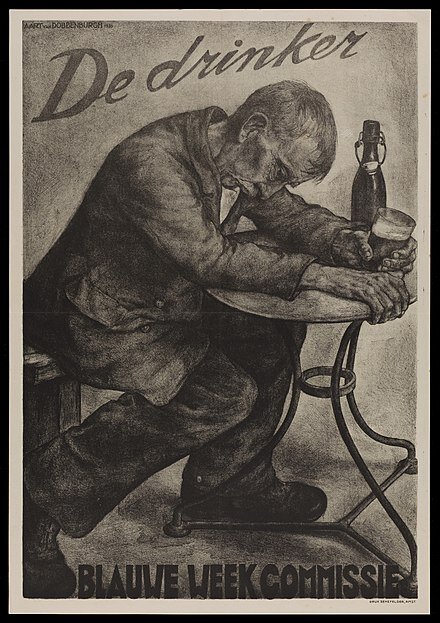
Those not entirely wasted hours at journo-favored bars
— Photo by Ragesoss
A 1936 anti-drinking poster by Aart van Dobbenburgh
Adapted from Robert Whitcomb’s “Digital Diary,’’ in GoLocal24.com
For various reasons, going to New York City, as I did recently, reminds me of the bars that we newspaper and magazine reporters and editors used to patronize. This wasn’t a particularly healthy practice, but these places planted some evergreen memories.
Some of the joints I most remember:
Foley’s, in Boston, beloved of Boston Herald Traveler, Record American and Globe editors and reporters, especially scruffy police reporters, with their tales of gruesome or comic crimes and police and political corruption, and news and copy editors having their “lunch” at around 8:30 p.m. between edition deadlines.
Some actually consumed the bar’s pickled eggs as they knocked back their boilermakers --- a shot of whiskey followed by a beer, or pouring a shot of whiskey into their beers and then chugging that – or downing other, not very elegant beverages. I was often amazed that some of these journos could function at all under deadline pressure upon returning to the newsroom after “lunch” at Foley’s. Certainly many of them looked ill and aged fast. Some had noses that were tributes to the distillers’ art.
The older guys (and virtually all these colleagues were men) told vivid stories going back to the ’40s of life in what was then a gritty city. Others were taciturn, as if battered into silence by bad hours and what they had seen and heard on the job in a business in which grim news usually sells better than good.
Then there was the bar off Broad Street in Lower Manhattan where a couple of Wall Street Journal editing colleagues and I would occasionally retreat in mid-evening after work. (We’d stop working soon after listening to WQXR, then The New York Times’s radio station, to learn if we had missed a story that our biggest rival had so we could make necessary adjustments. The station helpfully broadcast a review of its next day’s Page One at 9 p.m.)
One night we came across what appeared to be a corpse on the sidewalk outside the bar that appeared to have been there for a while. A cop came along to deal with the body. (The neighborhood was virtually deserted at night in those days because few people lived there then and there were few food stores, etc., to serve them. Now there are many apartment buildings, put up during the off-and-on boom years from the mid-‘90s to COVID, and so it has much more of a 24/7 feel, though less than before the pandemic.)
In the bar we almost got into a fist fight with a drunk who insulted our colleague Ruth; in the event, he was evicted from the establishment.
I well recall the bar/restaurant in Wilmington, Del., called The Bar Door. That’s where some of us working for the News Journal, The First State’s statewide rag, then owned by the remarkably kindly DuPont family, would lunch at least once or twice a week. My colleagues there were the most abstemious of the newspaper types I hung out with in my career, usually just confining themselves to a Rolling Rock beer. And the food, especially softshell crab from nearby Chesapeake Bay, was good, so there was less drinking on empty stomachs.
The local pols, such as, I think, Joe Biden, then a recently elected U.S. senator, would show up to gossip. My favorite was Melvin Slawik, the charming New Castle County (which includes Wilmington) executive, who was a font of stories, including very funny, self-deprecating ones about himself. He later served time for perjury, obstruction of justice and bribery. He was one of the most likeable people I’ve ever met.
There was Le Village, a bar and restaurant dangerously close to the offices of the International Herald Tribune, in the affluent Paris inner suburb of Neuilly. Because French labor law mandates frequent work breaks, too many of the staff spent too much time there drinking, and, as at all journalist hangouts in those days, smoking. Several were what you might call merely recreational alcoholics. (Growing up, I learned enough about alcoholics, recreational and full time, to last me several lifetimes.)
As the finance editor, in charge of overseeing a third of the paper, I was sometimes put in the awkward position of trying to stop the working-hours drinking of people reporting to me. In one case, I had to remove an engaging and smart, but too often drunk, colleague from consideration for a promotion. In any case, labor law sharply restricted disciplining staffers. It was tough to hire people and even tougher to fire them.
There were other journo bars too, where I heard wild stories that could be the bases of a few novels and/or film-noirish movies, some of which stories were actually true. But my time in such places mostly ended about 30 years ago. One reason I’m still alive.
Oh, yes! There was a bar called Hope’s that was heavily patronized by Providence Journal people, and owned by two of them, but I only made a few clinical research visits.
Malcolm Muggeridge (1903-1990), the great English journalist, satirist, spy, womanizer and late-in-life religious fanatic, once said something to the effect that he regretted the smoking he did, but not the drinking, because of the stories and camaraderie he got out of the latter. But drinking and smoking are two devils embracing.


